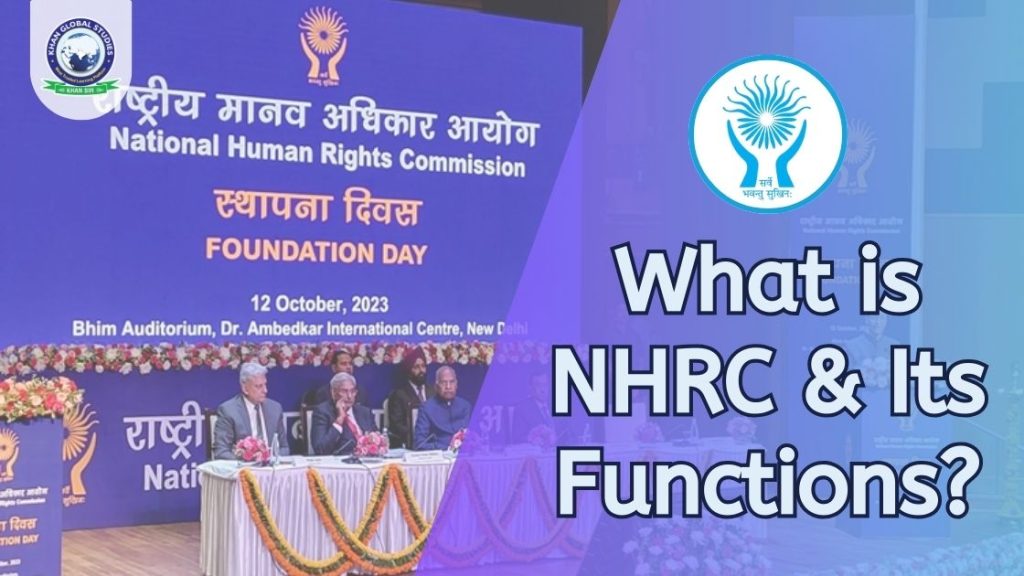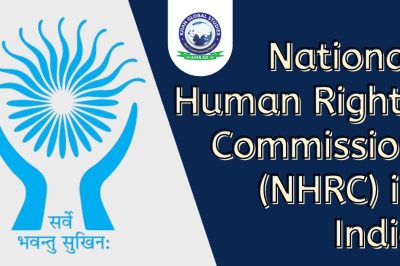In a world where individual rights sometimes face challenges, the National Human Rights Commission (NHRC) acts as an important safeguard in India. Established in 1993, this statutory body plays an important role in promoting and protecting the fundamental rights guaranteed by the Indian Constitution.
What is the National Human Rights Commission?
It is a statutory (not constitutional) commission created by an Act of Parliament, formerly the ‘Protection of Human Rights Act, 1993’. It was amended in 2006 and 2019.
Definition of Human Rights:- Rights granted by the Constitution, human rights determined by international treaties and human rights recognized by the court, that is, such rights that we have as human beings.
Therefore, the National Human Rights Commission was formed to protect human rights and prevent encroachment of rights.
NHRC Chairperson and Selection Committee of Members
It is a multi-member commission, earlier it consists of:
1 Chairperson,
4 whole-time members and
4 Ex-officio members,
but after the amendment in 2019, it now consists of:
1 Chairperson, and
5 Ex-officio Members. Whole-time members and
7 Ex-officio members. ,
The Chairman of the Commission should be a retired judge of the Supreme Court. Earlier the President was the Chief Justice of the Supreme Court.
How many members are there in the National Human Rights Commission?
Full-time members – Members who have completed their tenure include-
- One member is a serving or retired judge of the Supreme Court.
- One member must be a serving or retired Chief Justice of a High Court.
- There should be three members who have knowledge or experience related to human rights. At least one of them must be a woman.
Ex-officio Members (Short-Term Members) – It consists of 7 members, who have no connection with tenure.
- Chairman of the National Minorities Commission
- Chairman of the National Commission for Scheduled Castes
- Chairman of the National Commission for Scheduled Tribes
- Chairperson of the National Commission for Women
- Chairman of National Commission for Other Backward Classes
- Chief Commissioner of the National Commission for Protection of Child Rights
- Chief Commissioner for Persons with Disabilities
Who appoints the members of NHRC?
The members are appointed by the President on the recommendation of a 6-member committee-
- Prime Minister
- Union Home Minister
- speaker
- Deputy Chairman of Rajya Sabha
- Leaders of the main opposition parties of both houses of Parliament
Tenure of NHRC members
- 30 years or 70 years
- eligible for reappointment
- After completion of their tenure, they are not eligible for any post in the Center or State.
- He can be removed by the President on the grounds of misbehaviour or incompetence on the report of the Supreme Court.
Core Functions of NHRC
- Investigates violations of human rights by the government or its agencies. This includes instances of torture, illegal detention, and discrimination based on factors like caste, religion, or gender.
- Recommends appropriate remedies to victims of human rights violations. This can involve compensation, legal assistance, or even prosecution of perpetrators.
- Issues guidelines and recommendations to improve human rights practices in the country. The NHRC regularly reviews and suggests changes to laws and policies to ensure better protection of human rights.
- Spreads awareness about human rights through education and advocacy. The NHRC organizes seminars, workshops, and campaigns to sensitize the public and government officials about their human rights obligations.
How does NHRC work?
- The Commission has its investigation team to investigate complaints related to human rights violations.
- Apart from this, the Commission can take the services of any officer or investigating agency of the Central or State Government and the Commission can ask for any information or report from the Central or State Government.
- The Commission has all the rights and powers of a civil court and its character is also judicial.
- The Commission cannot investigate cases older than 1 year.
Who can approach the NHRC?
Any Indian citizen who feels their human rights have been violated can approach the NHRC for help. There are no fees involved in filing a complaint, and the NHRC provides various channels for filing complaints, including:
- Online portal: https://nhrc.nic.in/
- Postal mail
- Visiting the NHRC headquarters in New Delhi or designated regional offices
Powers of the National Human Rights Commission
- The National Human Rights Commission has all the powers of a civil court under the Code of Public Procedure, 1908.
- He can also ask for records of all proceedings from the police and issue summons to any person.
- The Commission itself functions as a civil court through which it protects human rights.
- Prison inspections are also conducted by the National Human Rights Commission to eliminate child labour, which inspects factories where human rights violations are likely to occur.
- The Commission assists in human rights cases pending in the Supreme Court.
- The head office of the National Human Rights Commission is located in Delhi and it can also open its offices at other places in India.
- It also has its investigation team to investigate complaints related to human rights violations.
- Apart from this, it can also take the services of any officer or investigating agency of the Central and State Governments.
- The Commission has good coordination with NGOs.
Limitations of the National Human Rights Commission
- The recommendations given by the Commission are advisory,
- Due to this the Commission neither has the right to punish any person nor to provide financial assistance to any person.
- That means it is in the hands of the government to accept its recommendations or not.
- The Government is not bound to accept the advice of the National Human Rights Commission, yet there is a provision that the Government shall inform the Commission within one month as to what action has been taken on the issue.
- The Commission cannot investigate human rights violations by the armed forces, For example, allegations of human rights violations are made in Jammu and Kashmir, eastern states and actions were taken against Naxalites, but the Commission directs the government to investigate these cases.
- The Commission cannot investigate any case in which more than 1 year has passed.
- The Commission also does not have sufficient officers of its own, so the Commission has to depend on those departments of the government against which there are allegations of human rights violations for investigation.
Role of the National Human Rights Commission
- The role of the Commission is advisory.
- There is no right to punish.
- Cannot provide financial assistance.
- Participating in human rights-related proceedings in court.
- To review human rights in jails and prisons.
- Investigating incidents that violate human rights, including terrorist incidents.
- In cases of human rights violations by the armed forces, it can give its advice only after receiving reports from the Central Government.
Impact and Significance
The NHRC has played a pivotal role in upholding human rights in India, addressing numerous violence, discrimination, and injustice cases. Its interventions have led to positive outcomes for victims, including compensation, release from illegal detention, and policy changes. While challenges remain, the NHRC stands as a symbol of hope and accountability, ensuring that fundamental rights are not merely enshrined in the Constitution but also translated into reality for all citizens.
FAQs
Question: When was the National Human Rights Commission established?
Answer: National Human Rights Commission is an independent institution, which was established in 1993.
Question: Process to remove members of NHRC?
Answer: NHRC members can be removed by the President on the grounds of misbehaviour or incompetence on the report of the Supreme Court.
Question: Who constitutes the National Human Rights Commission?
Answer: It is a statutory (not constitutional) commission created by passing an Act by the Parliament, formerly known as ‘Protection of Human Rights Act, 1993’. It was amended in 2006 and 2019.
Question: When is Human Rights Day celebrated?
Answer: Human Rights Day is celebrated on 10 December.
Question: Who is the Chairman of the National Human Rights Commission?
Answer: The Chairman of the National Human Rights Commission is Justice Arun Kumar Mishra.
Question: Where is the office of the National Human Rights Commission in India?
Answer: The head office of the National Human Rights Commission is located in Delhi and it can also open its offices at other places in India.





